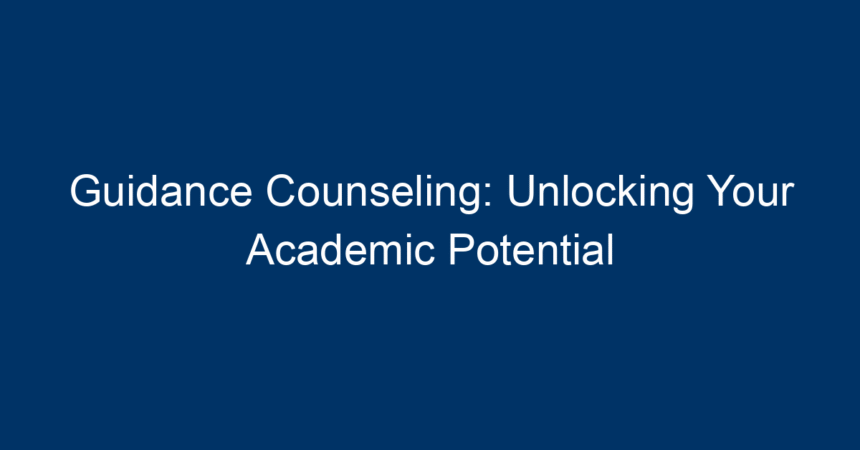In today’s competitive educational landscape, students often find themselves overwhelmed by choices, challenges, and pressures. This is where guidance counseling comes into play. It serves as a pivotal resource for students navigating their academic journeys, providing much-needed support, clarity, and direction. In this article, we will delve into the numerous benefits of guidance counseling, the different types of counseling available, its role in developing academic potential, and actionable insights for students.
Understanding Guidance Counseling
Guidance counseling is a professional service designed to help students make informed decisions about their education and future. School counselors work with students to address academic, social, and emotional challenges, ensuring they unlock their full potential. The role of these professionals extends beyond mere academic advice; they serve as mentors, advocates, and resources for personal development.
The Importance of Guidance Counseling
1. Academic Support
One of the primary roles of guidance counseling is to offer academic support. Counselors help students identify their strengths and weaknesses, develop study strategies, and set realistic academic goals. Whether it’s selecting appropriate courses, preparing for standardized tests, or improving time management skills, guidance counseling equips students with the tools they need to succeed.
2. College and Career Readiness
As students progress through their academic journey, they often face the crucial decision of choosing a college and career path. Guidance counselors provide valuable insights into college selection, application processes, and scholarship opportunities. They also assist students in exploring various career options, connecting educational experiences with future job prospects.
3. Emotional and Social Development
Education is not solely about academics; emotional and social development plays an essential role in a student’s overall growth. Guidance counseling addresses these aspects by offering support for issues such as stress, anxiety, bullying, and interpersonal relationships. Counselors provide a safe space for students to express their feelings and work through their challenges.
Types of Guidance Counseling
Guidance counseling can be categorized into several types, each focusing on different aspects of the student experience:
1. Academic Counseling
Academic counseling focuses on helping students with their educational pursuits. Counselors work with students to create personalized academic plans, offering strategies to improve grades and achieve academic goals.
2. Career Counseling
Career counseling aids students in exploring various career paths, identifying interests, and setting professional goals. Counselors may provide assessments to help students understand their skills and interests, guiding them toward suitable careers.
3. Personal Counseling
Personal counseling addresses emotional and social issues impacting students’ well-being. It focuses on building resilience, enhancing coping skills, and fostering positive relationships. Counselors often provide a listening ear and practical advice to help students navigate life’s challenges.
The Role of Guidance Counseling in Academic Success
Building Self-Confidence
One of the most significant impacts of guidance counseling on academic success is the boost in self-confidence it offers students. Counselors encourage students to set achievable goals and celebrate their accomplishments, no matter how small. This fosters a positive mindset and motivates students to strive for excellence.
Enhancing Decision-Making Skills
Guidance counseling teaches students critical decision-making skills necessary for academic and personal success. Counselors help students evaluate options, consider consequences, and make informed choices, enabling them to feel more in control of their academic paths.
Fostering Resilience
In an academic environment filled with challenges, resilience is crucial. Guidance counselors provide students with coping strategies for dealing with setbacks, encouraging them to learn from failures rather than be discouraged by them. This resilience is essential for long-term success.
Actionable Insights for Students
To make the most of guidance counseling, students can take proactive steps to ensure they maximize these valuable resources. Here are some actionable insights:
1. Be Open and Honest
Communication is key in guidance counseling. Students should feel comfortable sharing their thoughts, concerns, and aspirations with their counselors. Being open and honest allows counselors to provide tailored support that meets individual needs.
2. Set Realistic Goals
Setting specific, measurable, achievable, relevant, and time-bound (SMART) goals can help students stay focused and motivated. Counselors can assist in creating these goals, helping students map out a clear path to academic success.
3. Engage Actively
Students should actively engage in their counseling sessions. This means coming prepared with questions, concerns, and topics they’d like to discuss. The more involved they are in the process, the more they’ll benefit from the guidance counseling experience.
4. Take Advantage of Resources
Guidance counselors have access to numerous resources, including workshops, assessments, and networking opportunities. Students should take advantage of these resources to gain insights and skills that will aid their academic and career development.
5. Seek Continuous Support
Guidance counseling isn’t just for moments of crisis. Students should consider their counselors as ongoing support throughout their academic journey. Regular check-ins can ensure they remain on track and address any concerns that may arise.
Conclusion
In conclusion, guidance counseling plays a vital role in unlocking academic potential for students. By providing academic support, career guidance, and emotional resources, counselors help students navigate the complexities of their educational journeys.
Act Now!
If you’re a student seeking to enhance your academic experience, don’t hesitate to reach out to your school’s guidance counselor. Engage in discussions, set goals, and utilize the resources available to you. Remember, seeking guidance isn’t a sign of weakness; it’s a proactive step toward achieving your dreams. Embrace the support of guidance counseling, and watch as you unlock your full academic potential!




